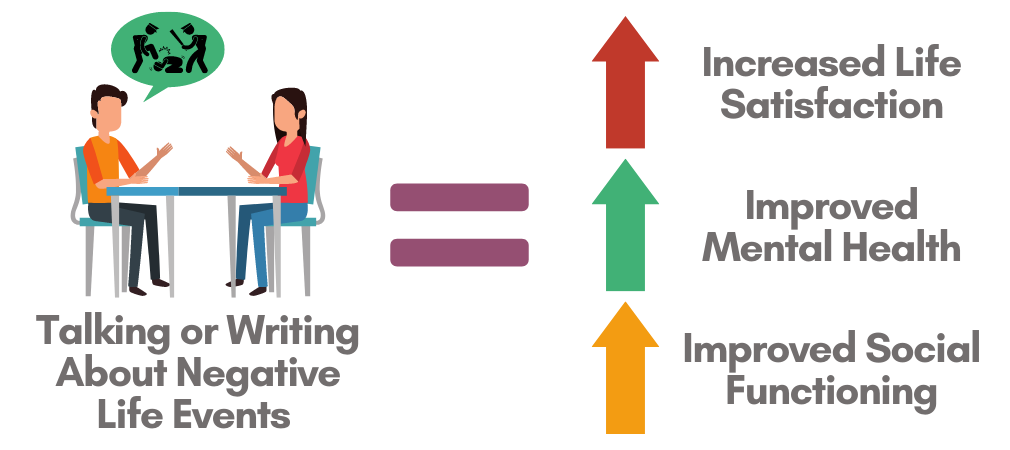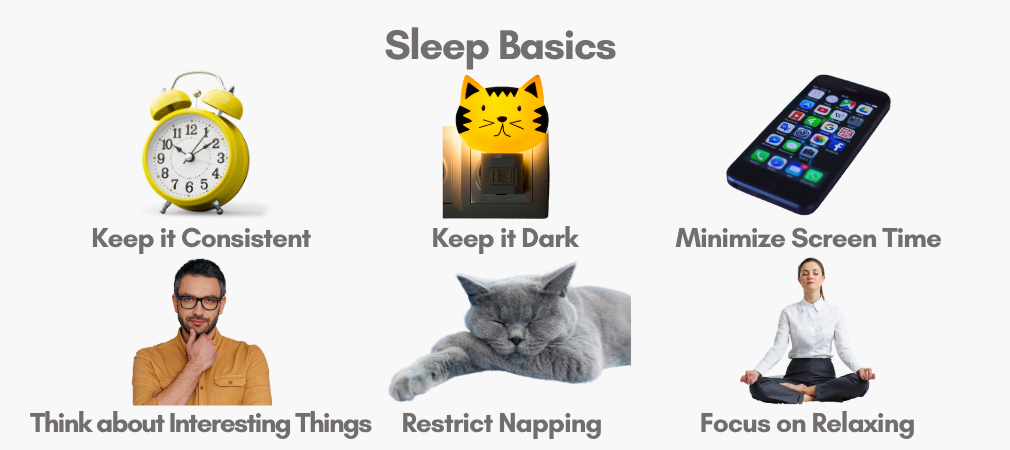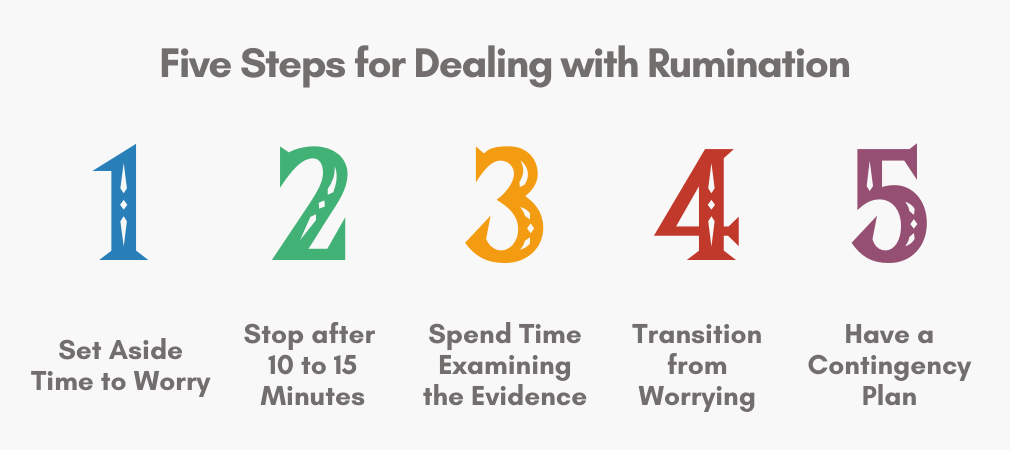A Simple (But Effective)
Way To Increase Life Satisfaction
For most people, I suspect that life satisfaction would be a top-of-mind need. How can I get as much enjoyment out of life as humanly possible?
Researchers at the University of California decided to ask their study participants a similar question. They were concerned with how we think about past events in our lives and their impact on our well-being.
Lyubomirsky et al. (2006) ran a series of 3 experiments examining how best to process both positive and negative events from the past.
Two key findings emerged.
First, study participants who talked or wrote about negative events with others, instead of privately examining the events in their mind, experienced more life satisfaction, improved mental health and social functioning.
Second, examining a positive development in your mind and trying to deconstruct why it was enjoyable, reduced feelings of well-being.

Take-Home Message
When it comes to negative life events, we can increase life satisfaction by talking or writing about them. This helps to explain how psychotherapy/counselling can be effective at helping people to cope with negative life events from the past.
Merely thinking about the good times, without analyzing why they were positive, will help you feel better.
3 Quick Strategies For Dealing With Negative Life Events
One crucial factor that can help influence your overall satisfaction with life is how well you cope with negative life events.
Negative life events are unavoidable. The goal with these events is to manage your emotions well and deal with them as quickly as possible, so they don’t interfere with your overall happiness level.
Let’s look at a few basics that can help you to manage negative life events more effectively.
Get a good night’s sleep
I know this might be a bit of a challenge, as rest is usually one of the first things to suffer when life becomes more challenging.
But as George S. Patton Jr. said,“Fatigue doth make cowards of us all”
Given that it can be challenging to predict how long a stressful time will last, sleep will be essential.
Here are a few quick tips to get you started
- Have a consistent sleep and wake time, including weekends (if there’s one point all sleep researchers can agree on, it’s this one!)
-
Reread the first bullet point (no excuses, no matter how tired you are)
- Keep your room dark
- Minimize your screen time before bed (in an ideal world, you would cut out screen time out 4 hours before bed, but that’s probably unrealistic for most, so aim to cut out devices at least 30 minutes before bed)
- Have something interesting and stress-free to think about while attempting to rest (trying to think about nothing will likely lead to worry)
-
If you can’t resist napping, set the alarm and don’t exceed 45 minutes (and do your best to restrict napping until early afternoon)
-
When attempting to sleep, focus on relaxing (don’t put too much pressure on yourself to sleep, as this will make it more difficult)
Manage stress well
When adverse events happen, and life feels like it’s going against you, this is a particularly good time to lock down on stress management basics.
Because when you add stress to any pre-existing problem, it gets worse. And of course, when something negative happens, the last thing you want to do is make things worse.
Below, I’ve outlined a few cognitive and behavioural tasks you can use to help keep your stress levels in check.
- Maintain a consistent daily routine (or put another way, if you are going through hell, keep on going!)
- Exercise (the body wants to move, and the mental and physical health benefits are almost endless)
- Periodically check-in on your breathing (slow it down and breathe from your stomach)
- Drink water consistently throughout the day (we are 60% water, you need to function optimally)
- Eat small meals throughout the day (it helps to have consistent fuel to keep going)
- Make problems the correct size (we tend to make issues more significant than they deserve to be)
- Using relaxing self-talk (calming phrases can help you avoid catastrophizing, which creates feelings of anxiety and panic)
- Challenge negative thoughts (bring out your inner-lawyer and look at the evidence – chances are good that things aren’t as bad as they seem)
- Prioritize time to focus on what’s going well (there is always something you can feel good about, even if you have to dig a little to find it)
Have A Plan To Deal with Rumination
What’s ruminating?
Ruminating occurs when someone repeatedly worries about a stressor in life, past, present or future.
The more you ruminate, the worse you feel, and feelings of panic and anxiety increase, which usually leads to catastrophizing (i.e., making problems bigger).
Not to mention, consistent rumination leads to problems with depression.
And when adverse life events occur, especially if the problem is ongoing, there is a strong temptation to ruminate.
Here’s a 5 step plan to manage it:
Step 1 – Begin to isolate when you allow yourself to worry
Trying to eliminate worry is next to impossible. Instead, you want to set aside time(s) to worry, so you don’t do it continuously.
This helps to mess with your brain’s pattern saying, “Hey, it’s time for you to worry,” You respond by saying, “Yes, brain!” and start to worry.
Step 2 – Worrying can’t exceed 10 – 15 minutes
Worrying is like scratching an itch. Once you get started, it’s hard to stop. It seems to have a momentum all its’ own.
So, the goal is to stop somewhere between 10 – 15 minutes; otherwise, you will likely start to ruminate about the problem, which will lead to catastrophizing about how bad things could become.
Step 3 – When worrying, remember to look at the evidence
Setting aside 10 – 15 minutes to worry isn’t for the express purpose of scaring yourself the entire time.
Instead, you want to spend some of your time examining evidence.
Doing so will help make problems the correct size and ideally help you come up with reasons why your challenge shall pass or at least become more manageable.
Step 4 – Have a plan to transition from worry
As mentioned above, once you start worrying, it’s hard to stop. It’s essential to have a plan, allowing you to transition away from worrying and carry on with the rest of your day.
But before doing so, set your next time to worry (e.g., 1 hour later or however long you think you can wait before focusing on worry again).
Now that you are ready to stop worrying, you need something interesting to grab your attention, so thoughts of worry can go to your mind’s side, while something interesting can move to the front and center of your mind.
The best way to do this is to have a conversation with someone about a different topic, as this is a reasonably cognitively demanding task.
If there is no one available to talk to, engage in a task that is interesting and ideally, cognitively challenging, so it helps to occupy your focus.
Step 5 – Have a contingency plan if you are still worrying.
Inevitably, thoughts of worry tend to jump back into your mind, and it’s tempting to return to worrying.
Remind yourself that you can return to worrying at the predetermined time you set earlier and return to that interesting task you had been focusing on.
If you are still worrying, ask yourself if there is something impactful you can do right now to change the situation that will lessen your worry. If there is, do it.
If not (which will likely be the case the vast majority of the time), recommit to worrying again at the predetermined time you set in the future.
Do you find yourself talking about negative life events with friends of family?
Do you tend to overanalyze things that are going well?



